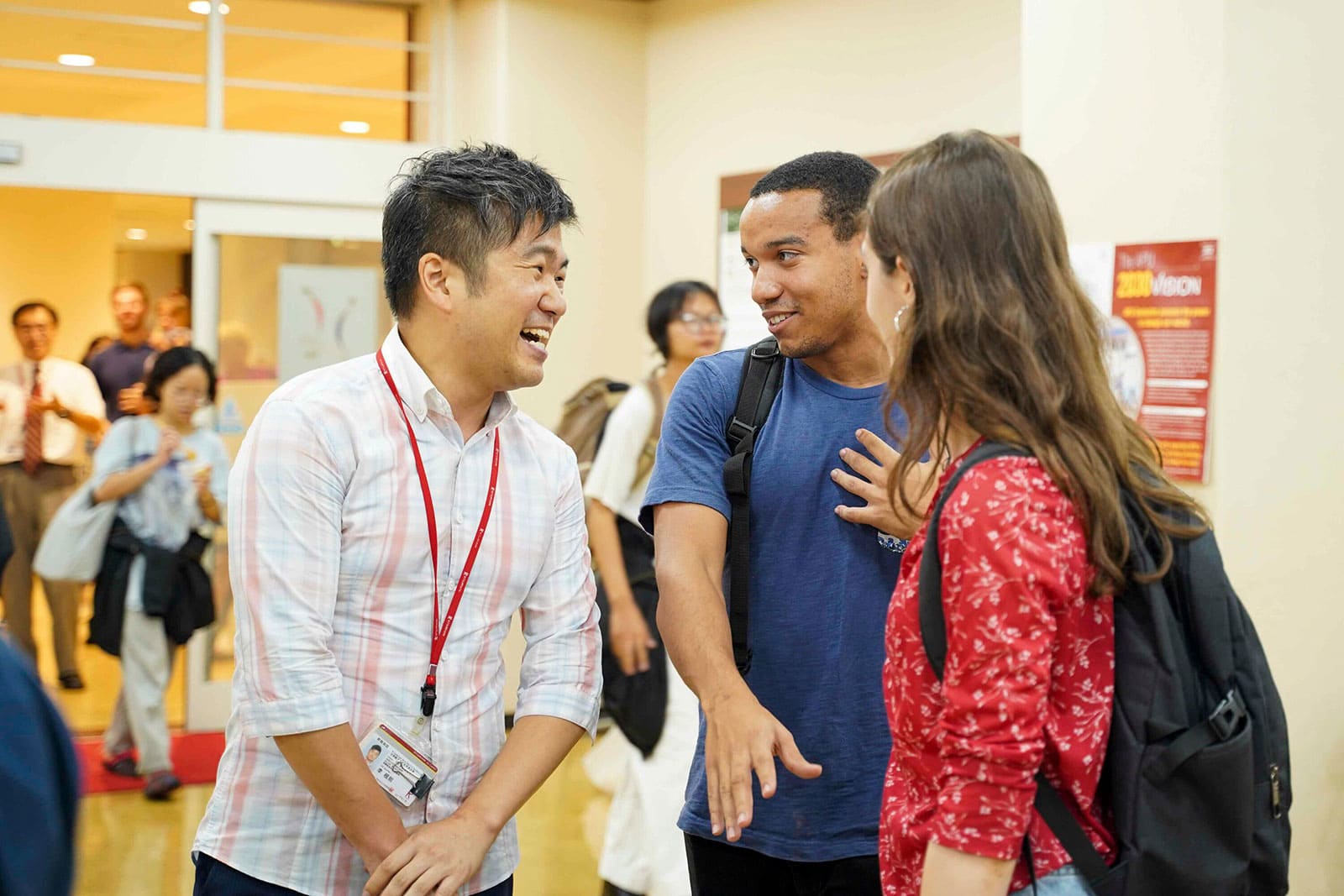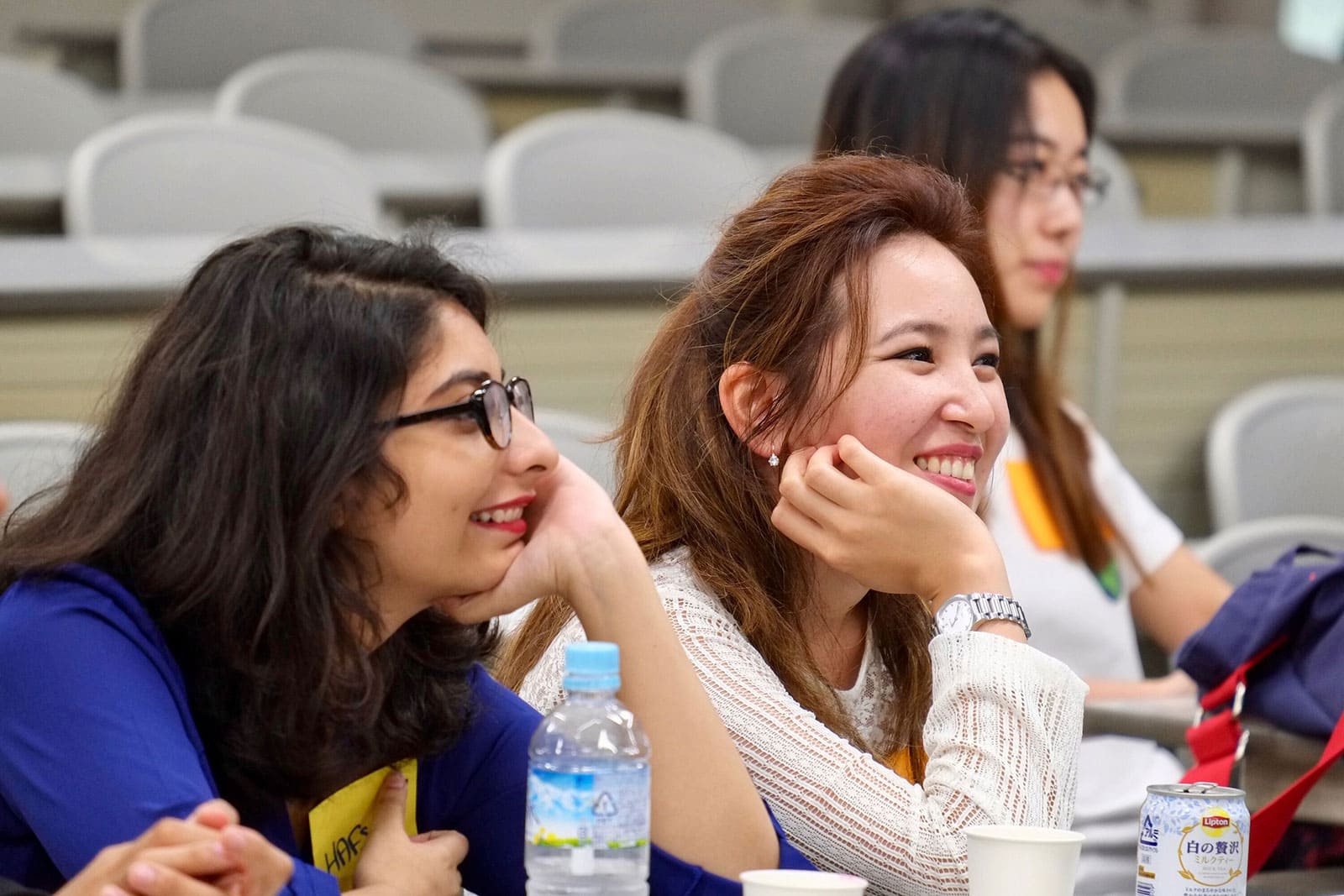NAVI
FAQ
STUDYING AT APU
-
There are two graduate schools at APU, the Graduate School of Asia Pacific Studies (GSA) and the Graduate School of Management (GSM).
In the GSA there is a master’s degree program and a doctorate degree program. For the GSA master’s degree, students can choose between our Asia Pacific Studies (APS) program or our International Cooperation Policy (ICP) program, both will lead to a Master of Science. In our doctorate degree program students can study Asia Pacific Studies (APS), leading to a Doctor of Philosophy.
For the GSM, students can study in our Business Administration (MBA) program, leading to a Master of Business Administration. -
Yes. Our graduate schools’ curriculum is taught completely in English. Therefore, Japanese ability is not required.
-
Basic Japanese language subjects are available for those who are interested in studying Japanese. The classes are Survival Japanese 1 and 2 and Japanese for Communication 1 through 4. Japanese for Communication courses are only available for those who complete or test out of the Survival Japanese classes 1 and 2.
For students studying in our Graduate School of Management, Japanese for Communication classes can be counted towards the credit requirements for program completion.
*All students who wish to take Japanese language classes must take the mandatory Japanese Placement Test after enrolling at APU. -
APU does not offer a degree in Japanese.
-
APU has support through the Career Office to help students in their job search. APU’s professors also offer their support to students, and there are Alumni Panel events held for students considering employment in Japan.
LIFE AT APU / IN JAPAN
-
APU provides an arrival assistance service on specific dates before each semester where student staff greet incoming students at Fukuoka Airport to help them travel to APU for the first time. Before classes start, as a new student, you will participate in several orientation sessions. Also, at AP House 4, the designated student housing facility for all graduate students, experienced students selected as Resident Assistants (RAs) are available to provide support to residents.
-
While Japan's metropolitan areas such as Tokyo and Osaka have quite high costs of living, APU is located in Beppu, which is a mid-sized city and thus considerably less expensive. Many students also choose to do part-time work while studying to help cover expenses.
-
The designated residence for graduate students is AP House 4, APU’s student housing facility, which is located off campus in downtown Beppu. It takes about 30 minutes to reach campus by local bus. For students who wish to live in different off-campus housing or if they are coming with their family, they can find other affordable options, as Beppu is considerably less expensive than other Japanese cities for private apartments and shared student housing.
-
The city of Beppu is serviced by a comprehensive public bus system, which provides easy access to campus. As a student, you will be eligible to purchase a discounted yearly commuter bus pass. While you may own a car, you are not permitted to drive or park on campus. You may drive motorbikes to campus with proper permission.
-
If you wish to do part-time work as an international student on a student visa, you are first required to apply for a work permit that allows you to work up to 28 hours per week part-time while school is in session. During breaks and vacations, you are permitted to work up to 40 hours a week. You can apply for this permit at the On-Campus Student Job Center after arriving at APU. Jobs are available both on and off campus. The average hourly wage is around 790-1000 JPY.
-
The APU cafeteria on campus serves breakfast, lunch and dinner and is open daily even when classes are not in session. Pacific Café is another option and serves lighter food such as sandwiches and ice cream. This café is closed between semesters and during school holidays.
-
APU's cafeteria and café offer a variety of foods to meet the needs of those students with personal or religious diet requirements, such as vegetarian or halal. Additionally, AP House 4 has communal kitchens that students are free to use to prepare their own meals. Some restaurants in Beppu offer vegan, vegetarian and halal options as well.
-
It is possible to bring a phone with you from your home country/region. However, you will need to do some research as certain countries/region’s phones do not support the radio frequency bands used in Japan. If this applies to you, there is the option of buying a phone in Japan. You can buy phones from electronic stores like Yamada Denki or from second hand shops in Beppu. Prices will vary depending on the model, but another thing to keep in mind is that you will need to check with the provider you choose to go with whether that model is compatible with their SIM cards. In Japan there are the 3 big companies for phones but in recent years there have been more discount or cost effect companies. All of these companies also typically provide student discounts.
TUITION, FEES, SCHOLARSHIPS AND FINANCIAL AID
-
Tuition at APU varies for each of the Master’s programs and the Doctorate program.
Graduate School of Asia Pacific Studies (GSA) –
Total tuition for Master’s (2 years) Total tuition for Ph.D. (3 years) 2,800,000JPY4,300,000JPY per yearGraduate School of Management (GSM) –
Total tuition for Master’s (2 years) 3,800,000JPY -
Tuition at APU covers course fees. Tuition does not cover other expenses such as books, transportation, housing, food, or health insurance. In addition, some off-campus programs conducted by APU require a participation fee. However, these programs are not required for graduation and are taken voluntarily.
-
International students who will obtain a student visa are eligible to apply for the APU Tuition Reduction Scholarship at the time of application. There are also external scholarships available. Eligibility and application requirements can be found on the external scholarship page.
Once you become an APU student, there are other scholarships that you can apply for. You will receive more information about these after enrollment. -
Those who wish to apply for this scholarship may request to be considered within the APU Online Application System at the time of application. You will be evaluated for the scholarship based on all of your application documents, assessment tests, and interview. It is not possible to apply for the APU Tuition Reduction Scholarship after enrollment.
-
There are scholarships for living expenses that you may apply for after enrollment at APU's Student Office.
-
The Ritsumeikan Center for Asia Pacific Studies (RCAPS) offers financial subsidies for graduate school students in the form of a Master’s Field Research Support Subsidy for Master’s students and a Ph.D. Research Support Subsidy for Ph.D. students. These subsidies support graduate school students in their research endeavors. For more information on these subsidies, students can consult with the RCAPS secretariat on campus after enrolling at APU. There are also opportunities to apply for a number of different scholarships after enrollment and students are encouraged to apply for private scholarships in their home country if possible.
APPLYING TO APU
-
Applicants who have yet to complete an undergraduate degree may apply to APU's graduate school programs as long as they will complete their degree before their intended date of enrollment at APU. These applicants must submit a Certificate of Scheduled Graduation, an official document which states that they are scheduled to graduate by the time of their desired enrollment period, together with their application.
-
There is no minimum GPA requirement for APU graduate school for overseas applicants. However, some scholarships do have a GPA requirement. Please be sure to check the eligibility requirements for each scholarship you are considering to apply for.
For internal applicants, students who have a cumulative GPA of 3.00 and above (APU) or 3.50 and above (Ritsumeikan University) are preferred. Internal applicants refer to applicants who are currently enrolled at Ritsumeikan Asia Pacific University (APU) or Ritsumeikan University.
-
Whether or not you are required to submit TOEFL/IELTS or other test scores depends on your application method and educational history. Please refer to the relevant application eligibility requirements.
-
Submitting GRE or GMAT scores is recommended, but not mandatory to apply to APU.
-
All applicants are required to include two recommendation letters in their online application. One of the recommendation letter should be submitted by someone who knows you academically. The second letter can be written by another instructor, employer, or someone who is a non-relative and knows you on a professional or academic level.
Applicants must send a request directly to their recommender from within the APU Online Application System, after which the recommender will receive a notification email. The recommender may choose to submit the Letter of Recommendation either by filling out an evaluation form or by uploading a pdf file. The letter must be submitted in English.
-
During the application period, only digital copies of all required application documents must be uploaded through the APU Online Application System. After being accepted to APU, enrolling students must then submit original documents or certified documents* for the uploaded application documents to APU by post. If the original or certified documents* submitted after acceptance differ from the digital copies uploaded with the online application, or if enrolling students are not able to submit original or certified documents*, acceptance to APU will be revoked. Please be sure to keep the original versions of the documents you upload with your online application in order to submit them to APU if you are accepted to the university.
*A certified document is one that has been marked as being equivalent to the original with a stamp or seal by the issuing institution (preferred) or a notary public.
-
No. After acceptance to APU, APU must receive your official documents by post. As we cannot verify the authenticity of faxes or electronic images, they cannot be used for enrollment procedures.
-
APU requires every applicant to pay the application fee. This fee cannot be waived. The fee covers the cost of screening your documents. APU cannot begin screening your application until the application fee has been confirmed.
-
APU will not screen applications without confirming the payment of the application fee. In principle, APU will not contact applicants regarding unpaid application fees.
-
In general, the application fee is not refundable. However, a partial refund (after administrative fees are deducted) or a full refund may be possible in the following cases.
-
When the application fee has been paid multiple times, or in cases in when it is clear that the amount paid exceeds the amount for the application fee and administrative fees set by APU.
-
When your application is deemed inadmissible and is not screened.
Further information about our refund policy for the application fee can be found on here.
-
-
There is no age restriction when applying to APU. We welcome individuals of any age to apply.
-
To complete the application process to APU, the applicant must submit the online application, pay the application fee, and complete the online assessment. The status of your submitted application and the result notification date are available on the application status page in the APU online application system. If you have recently submitted your application, please allow a few business days for the status to be updated.
-
After completing your application process and your application has been screened, you will receive your admission result and APU Tuition Reduction Scholarship result by email. Refer to the application schedule for the final result notification date. Please follow the instructions on the email on how to check your results online.
-
If anything is missing from your application or we require any additional documentation, APU will contact you by email. Please check your email regularly so that you can respond to our inquiries as soon as possible. When you submit your application, make sure your email address and your postal address are written clearly and accurately. Please be aware that missing or incomplete documents may delay your admissions decision significantly.
-
The status of your submitted application is available on the application status page in the APU online application system. Please note that APU cannot give out final results by email or over the phone.
-
Please inform us at [email protected] when you change your mailing address, telephone number or email address.
-
No. In order to begin your COE application process, APU must be able to confirm that you are financially able to support the cost of studying in Japan. For this reason, we must receive all fee payments before beginning the COE application process.
-
Master's program applicants are not required to contact a supervisor when applying to APU. The supervisor will be specified by APU after enrollment.
Doctoral applicants must first contact their desired doctoral faculty supervisor via APU’s online Faculty Supervision Request Form and receive confirmation from their desired faculty member to act as a supervisor for the duration of the program prior to applying to APU.
ABOUT STUDENT VISA
-
A student visa is issued by your local Japanese embassy/consulate and grants you permission to enter Japan for an extended period of time and undertake university level studies. However, before you can apply for a student visa, you must obtain a Certificate of Eligibility (COE).
-
A Certificate of Eligibility (COE) is a document that is required to obtain a visa and is issued by the Immigration Bureau of Japan. If you are accepted and plan to enroll at APU, APU will apply for the COE on your behalf once you complete all enrollment procedures. Through the Online Enrollment Procedeure System you can submit information necessary for your COE. Enrollment Procedures Handbook can be found within the Online System and please follow the instruction in the Handbook on what documents to submit and how to complete the procedure. When the Immigration Bureau of Japan issues your COE via email, APU will forward the email to you. You must then apply at your local Japanese Embassy/Consulate for your student visa. Be sure to inquire at the Japanese Embassy/Consulate in advance about what documents are necessary to apply for a student visa and have them ready.
-
APU works very closely with every applicant and the Immigration Bureau to make sure applicants are able to receive their COE and a student visa. Typically, this process goes smoothly and as long as you submit all required documents in a timely manner with correct information and do not have a criminal record, you should be able to receive both the Certificate of Eligibility (COE) and your student visa. However, please be advised that the Immigration Bureau of Japan and your local Japanese embassy/consulate make all final decisions regarding the issuance of COE’s and visas, and APU cannot guarantee that you will be granted these.
-
Incoming students must enter required information for their COE into APU’s Online Enrollment Procedures System. Within this system you will need to upload PDF versions of required documents. However, in addition to these uploaded PDF copies, you will also need to send some of the official documents such as bank statements etc. by post as well, as APU cannot use photocopies when applying for COEs. If you submit photocopies, we will not be able to process your COE application until the original document or certified document* is received. APU will not return any of the submitted certificates regardless of the certificate type. Therefore, please submit certified documents* for original certificates that cannot be reissued.
*A certified document is one that had been marked as being equivalent to the original with a stamp or seal by the issuing institution (preferred) or a notary public.
-
Once APU has received all your documents and enrollment fee payments, your COE application will be processed and submitted to the Immigration Bureau. Once your COE application is approved, you will receive your COE by email. Most incoming students may expect to receive their COE during the following months: February – mid March (April Enrollment), July – early September (September Enrollment). As the COE issue date varies among the students and each year, we cannot guarantee that each student will receive their COE during the above mentioned months.
TRAVELING TO JAPAN
-
APU will advise you on the dates that you should arrive on campus. Arrival assistance is available for those who arrive on the dates specified by the university before the semester begins. You should not arrive on campus earlier than the specified dates as there will be no available rooms in the dormitory, and you have to look on your own for accommodation.
-
The closest major international airport to APU is Fukuoka Airport. If you are arriving in Japan at other airports (such as Narita, Haneda or Kansai), you can take a domestic flight to Oita Airport or Fukuoka Airport. (Limited flights between Oita Airport and South Korea are also available). Arrival assistance will be provided at Fukuoka Airport on specified dates.
-
If you are accepted to APU, your family can come live with you here in Japan while you study if they can get a family visa. However, they will not be able to come with you when you first arrive. After you come to Japan, you can begin the process to receive a family visa for your family members. It normally takes at least 3 months to receive the visa. They can come to Japan after their family visa is issued.
OTHER
-
We provide support in accordance with the Ritsumeikan Asia Pacific University Guidelines on Support Services for Students with Disabilities. We will work to contribute to the learning and growth of all students through these support services. The content of the support will be determined on a case-by-case basis in consideration of the nature and degree of the disability, the characteristics of the college, and area of study the student will belong too, and the overall needs of the student. For more details about the guidelines, please refer here.
-
Prospective applicants with disabilities or other medical conditions can request support during the admissions process, in accordance with the Ritsumeikan Asia Pacific University Guidelines on Support Services for Students with Disabilities, if they so desire. Please download the Admissions Support Request Form for Students with Disabiliteis which is available on the download page and send it at least 4 weeks before the deadline of your intended application period. When sending the email, please enter “Request for Support during the Admissions Process” in the subject line. APU will send the Support Request Results in an email within three weeks after sending out the Support Request Arrival Receipt.
-
Support for students with disabilities (physical disabilities, developmental disabilities, mental disabilities, and other disabilities of physical and mental functions) at the university is provided by a support system in each office so that appropriate support can be provided according to the needs of each student. For consultation regarding support during your studies and life after enrollment to APU, you should submit the following information to [email protected]. When sending the email, please enter “Request for Support after Enrollment” in the subject line.
Name or application number
What you would like to discuss
Desired support after enrollment
For more information regarding support for students with disabilities or other medical conditions, please click here.
-
The APU Health Clinic is not a full-service medical institution and therefore cannot perform medical procedures such as prescribing medication or giving injections and infusions (IV). Students who require medical care or treatment will need to use off-campus medical institutions. For information about the service rpovided by the APU Health Clinic, see their webpage here.
-
At the university, no medical treatment consultations can be performed and medication prescriptions cannot be made. If you are currently undergoing treatment for an illness or psychiatric disorder, please consult with your doctor about whether or not continued treatment will be necessary after enrolling. If you wish to continue your treatment at a Japanese medical institution after enrollment, you will need to prepare a treatment plan or a patient referral document in advance that clearly states the name of the condition, symptoms, test results, and course of treatment/treatment plan.
In addition, there are strict restrictions on bringing medications into Japan. Please be sure to check with the Japanese Embassy or the Health and Welfare Bureau in advance.
Ministry of Health, Labour and Welfare webpage, "Personal Import of Medicines from Overseas". You can refer to the Japanese version here and the English version here. -
APU cannot provide consultations for medical treatments or medication, but if you are currently undergoing medical treatment or have a psychiatric disorder and would like to consult with us about the academic or living considerations at APU, please contact us at [email protected] with the information below. Please note that it may take more than 1-2 weeks to recieve a response depending on the information sent.
Name or application number
Name of the disease or illness (if possible)
What you would like to discuss
Whether or not you have a personal doctor*
*If possible, include the status and history of treatment.
-
APU respects sexual and gender diversity as part of its commitment to human rights. APU aims to create an environment in which people of any sexual orientation and gender identity are able to study and live with the security of knowing that their human rights are fully protected, that they will be treated fairly, and that they need not suffer any discomfort or pain as a consequence of their sexual orientation or gender identity. You can refer to here to learn more about the University's basic policies and various initiatives.
-
For registration at APU, the gender and name on your passport will be used. The gender and name you provided will be used during the admissions process to apply for a visa to enter Japan and to register as a student at APU. However, after enrolling at APU, we will take into consideration your gender identity and how you have used your name in the past. If you wish to use a name or gender different from the one on your passport after enrollment, please contact [email protected] with the following information. Please note that when applying for a visa, you must use your gender and name in accordance with the policies of the Japanese government.
Name or application number
Your gender identity
Administrative name and nickname (if applicable)
Whether or not there is a possibility of having your administrative name changed in the future (if applicable)
Desired action after enrollment
This email will only be shared with a limited number of International Admissions Office staff. Please be assured that your personal information will not be shared with anyone outside of the International Admissions Office without your permission. However, in order to respond to your inquiry, your personal information may be shared with the Student Office or Academic Office in a non-identifying manner. The Student Office provides life support and manages student information after enrollment. The Academic Office manages student’s classes and examinations after enrollment.




